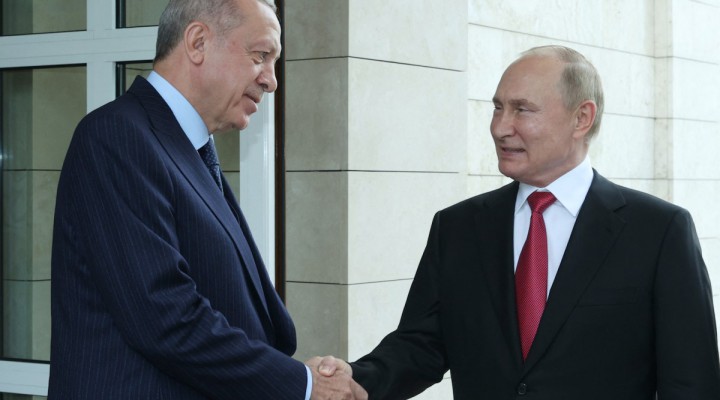Putin and Erdogan take each other’s measure

Little leaked from Russian and Turkish leaders’ three hour meeting but Syria, energy cooperation and S-400s were all on the table
Everyone at the table noticed, and everyone across Eurasia also noticed it.
At the recent Shanghai Cooperation Organization (SCO) summit in Dushanbe – where Iran was accepted as a full member and the prime topic of discussion was Afghanistan – Turkey was all but absent. As if it were no more than a minor, peripheral Eurasia player.
Turkey, though, happens to be an observer at the SCO – at the same level as Afghanistan.
That was not exactly a triumphal pre-entry for what, on Wednesday in Sochi, was the first face-to-face meeting between Presidents Recep Tayyip Erdogan and Vladimir Putin since they met in March 2020 at the Kremlin.
They talked for a little under three hours. No press statements. No substantial leaks, except for a casual Covid chat relayed by the Kremlin pool.
Erdogan: “What’s your antibody level?”
Putin: “15-16.”
Erdogan: “It’s too low.”
Putin: “Our calculations are different. You should get Sputnik V to strengthen your immunity.”
Erdogan: “I have received my third shot.”
Well, at least they seem to be well protected. Another – apocryphal – exchange might have gone along these lines:
Erdogan: “I need more S-400s.”
Putin: “Now, about those moderate rebels you are weaponizing in Idlib … ”
After all, these were the two issues at the center of discussion:
- Erdogan’s notorious zigzagging between NATO and a full commitment to what Russia defines as the Great Eurasian Partnership, and
- What exactly he might be up to in Syria.

All about Idlib
During his speech at the UN General Assembly, Erdogan said Crimea was part of Ukraine, an “annexation we do not recognize.” Much more than expressing his desire to reinstate a protectorate which the Ottomans kept until the end of the 18th century, Erdogan was more like parroting a trademark NATO talking point.
Erdogan and Putin also had to touch upon Ankara’s military-technical cooperation with Kyiv, especially the ultra-sensitive issue of drones that may be used against the people’s republics in Donbass.
In typical Erdogan hedging fashion, before the Sochi meeting, he had already expressed to US media his frustration as a NATO ally, going as far as sounding like one of the (Shiite) People Mobilization Units (PMUs) in Iraq. If he had a choice, he would want the US “to get out of Syria and Iraq, just like the way they have withdrawn from Afghanistan.”
In Sochi, the Kremlin played it very cool, with the official spin stressing how Putin pointed to the “successful cooperation” between Moscow and Ankara in Syria and Libya.
Other pleasantries followed, with Putin thanking Erdogan for his “consistent stand” on the construction of the key TurkStream gas pipeline, which Ankara badly needs. Compare his consistency with the EU’s stabbing itself in the back by not agreeing to long-term fixed-price contracts with Gazprom when they had the chance.
Erdogan, for his part, was raving about the construction by Rosatom of the first nuclear power plant in Turkey, in Akkuyu on the southern coast, which will become operational in 2022.
But the heart of the matter had to be Idlib.
Russian Foreign Minister Sergey Lavrov, on the sidelines of the UN General Assembly, went straight to the point regarding the special Turko-Russian arrangement requiring Ankara to fight the terrorist outfits in Idlib:
“The issue of how this obligation is implemented will be considered in detail. It is clear that it is being implemented slowly.”
Talk about a thundering euphemism defining a practically irreconcilable difference. The Russians know everything about Idlib being jihadi-infested, while Ankara only worries about a re-booted Syrian President Assad and Syrian Arab Army (SAA) launching the definitive offensive on Idlib with massive Russian air support.
The day is coming, fast, when the SAA will go for broke to retake the whole province.
The Turkish military, for its part, keeps over 60 “observation posts” in Idlib.
A key bottleneck to watch is Al-Zalwiya, in the countryside in southern Idlib. That’s a major hub for Hay’at Tahrir al-Sham (HTS) – oh, those Beltway-fancied “moderate rebels” – and a target of virtually daily Russian airstrikes raging across Greater Idlib.
Putin certainly will have questioned Erdogan about non-stop ceasefire violations by the al-Qaeda nebulae. Until recently, Turkish military forces in Idlib basically were contained in those “observation posts” – checkpoints – and infiltrated among the de facto Turkish proxy army notoriously referred to, for years, as the “Free Syrian Army.”
But now there are regular Turkish troops on the ground – 3,000 or so. The Russians argue that this officially amounts to the occupation of sovereign Syrian territory.

Lavrov has been consistently adamant for months now. Right after the UNGA, he said that Greater Idlib was the last “terrorist outpost” in Syria – and that’s technically correct.
It’s not unrealistic to picture Erdogan in front of Putin in Sochi desperately trying to defend his version of the ceasefire – and all but begging that Russian airstrikes not smash to bits the 3,000 or so Turkish troops in Idlib.
Every grain of sand in the Idlib countryside knows that Ankara is doing less than zero to respect the ceasefire, as the “moderate rebel” gang is de facto protected by the Turkish military.
So Sochi, in the end, solved nothing. But at least Putin may have had an insight about what the Sultan is up to.
https://asiatimes.com/2021/09/putin-and-erdogan-take-each-others-measure/
 TheAltWorld
TheAltWorld 
0 thoughts on “Putin and Erdogan take each other’s measure”